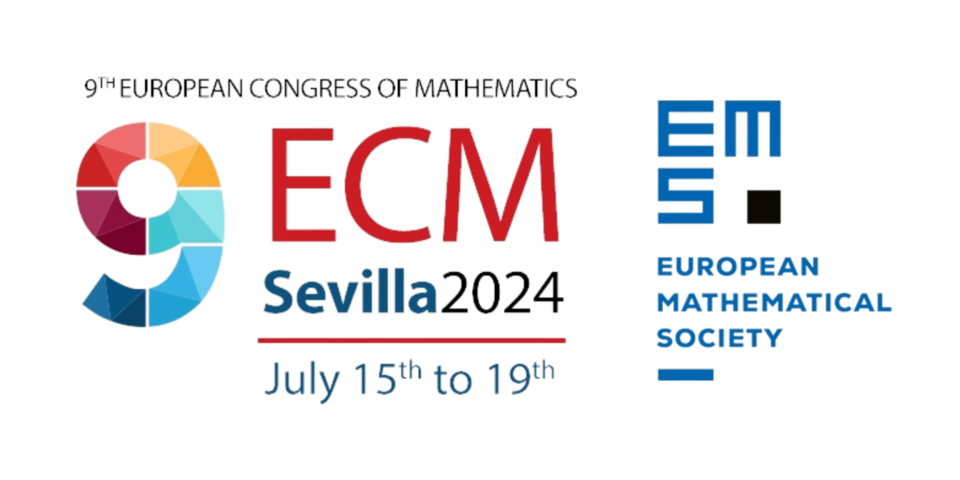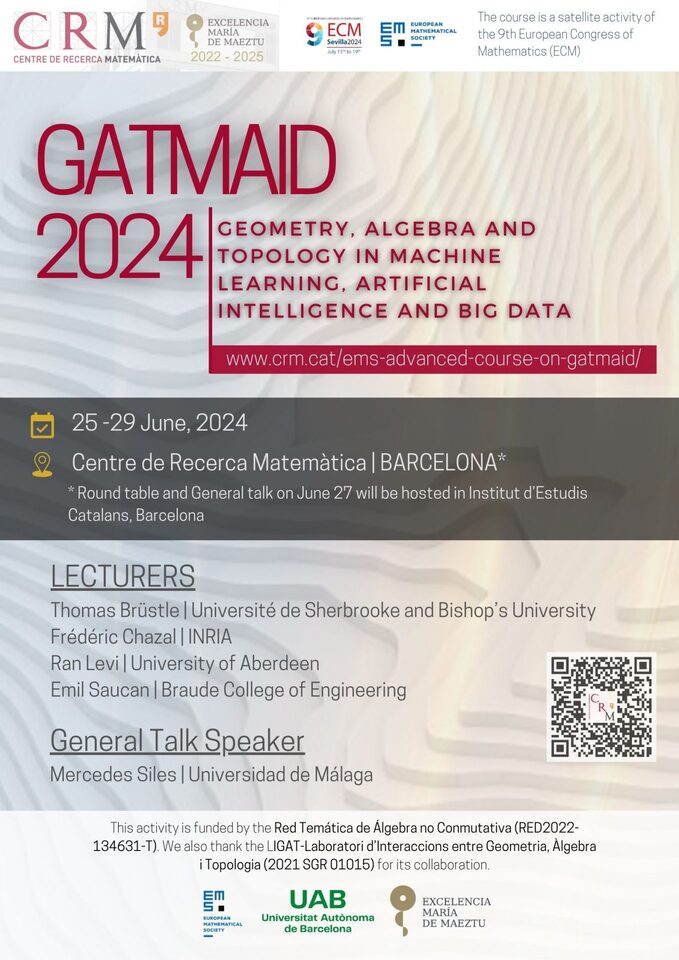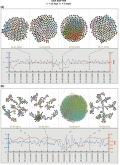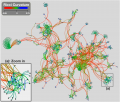LECTURERS
SCHEDULE
COURSES

REGISTRATION
-
-
Regular registration: 160 euros.*
-
Registration for ECM participants (20% discount): 128 euros.*
-
*Registration includes coffee breaks and social dinner. Lunch is NOT included.
Click here to register for the
open activities @ IEC
GATMAID EMS Summer School
Sign into June 29, 2024
The central topic of the school is Topologically Data Analysis, its impact in other areas of research and its emerging applications in real life problems. The school is organized in three courses of 6/7 hours each: the first one introduces the basic framework, while the other two address specific topics in Algebra and in Geometry that are currently growing out of the impulse of TDA. Each course will have two parts, one presenting the mathematical background and another one showing its potential for applications. Participants will be given information in advance on the recommended background for the school and during the school there will be tutorial/discussion hours.
The scientific part of the school is complemented with:
– few research talks by senior speakers, to illustrate some specific aspects related with them
– a poster session, in which willing participants will be able to present their work
– an activity open to general public. Consisting on a talk on ethic aspects related to Artificial Intelligence, and a round table with title: From pure research to technological transfer: a new era for mathematics?
The courses will be suitable for early PhD students or even Master level students willing to learn on the topic and that may be looking for prospective PhD topics and advisors. It will be a truly international event as speakers and participants will be coming from across the globe (although mostly from Europe) and the summer school is a prelude to the Conference LIGAT.
Related Activities:
Conference
JOINT PERSPECTIVES IN GEOMETRY, ALGEBRA AND TOPOLOGY

Thomas Brüstle
Université de Sherbrooke and Bishop’s University
He is a reputed researcher in Representation Theory of Finite dimensional algebras area in which he has been working for more than 25 years. In the recent years his main research interests has been moving to the domain of the applications of algebra, specially of homological methods to Data Analysis (persistence theory) and to Quantum Computing. Currently, he is combining theoretical research work on the classification of persistence modules with transfer of research projects with Optina diagnosis, using Data Analysis in early illness detection, and with AlgoLab on Quantum Computing.

Frédéric Chazal
INRIA
He is one of the world scientific leaders in developing new mathematical tools and software from the field of data science in order to analyze and use the topological structure of the data. He has authored over 60 publications on the subject, and two celebrated monographs for the SpringerBriefs in Mathematics and the Cambridge Texts in Applied Mathematics series. This theoretical strength is then applied to industrial projects that he leads though the DATAIA Institute.
Besides of being an excellent researcher, he is a reputed lecturer involved in the research oriented Master “Mathématiques, Vision, Apprentissage” where he frequently contributes with courses on Topological Data Analysis.

Ran Levi
University of Aberdeen
He has recently started a Research Group on Neuro-Topology at The School of Natural and Computing Sciences of the University of Aberdeen.

Emil Saucan
Braude College of Engineering
He is pioneer on the study of curvature of data. Together with J. Jost, A. Samal and M. Weber amongst other collaborators he introduced in 2016 the notion of Forman curvature in networks, where he has also studied discrete curvatures and discrete Ricci curvatures.
SCHEDULE
 | TUESDAY June 25th | WEDNESDAY June 26th | THURSDAY June 27th | FRIDAY June 28th | SATURDAY June 29th |
9:00 9:30 | REGISTRATION | ||||
9:30 10:20 | Topological Data Analysis Class 1 | Topological Data Analysis Class 3 | Topological Data Analysis Class 4 | Algebraic structures in TDA: Persistent Homology Class 3 | PH: discussion/problems |
10:30 11:00 | COFFEE BREAK | COFFEE BREAK | COFFEE BREAK + POSTER SESSION | COFFEE BREAK | |
11:00 11:50 | Topological Data Analysis Class 2 | TDA: discussion/problems | Algebraic structures in TDA: Persistent Homology Class 2 | Algebraic structures in TDA: Persistent Homology Class 4 | Algebraic structures in TDA: Persistent Homology Class 5 |
12:00 12:50 | The Geometry of Data: Curvature and Beyond Class 1 | Algebraic structures in TDA: Persistent Homology Class 1 | PH: discussion/problems | The Geometry of Data: Curvature and Beyond Class 4 | The Geometry of Data: Curvature and Beyond Class 5 |
13:00 15:00 | LUNCH | ||||
15:00 15:50 | The Geometry of Data: Curvature and Beyond Class 2 | GD: discussion/problems | General Talk at the IEC (Barcelona, city center) | Special lecture by Ran Levi | |
16:00 16:20 | COFFEE BREAK | BREAK | COFFEE BREAK | ||
16:20 17:10 | TDA: discussion/problems | The Geometry of Data: Curvature and Beyond Class 3 | Round Table at the IEC (Barcelona, city center) | GD: discussion/problems | |
18:00 20:00 | GUIDED TOUR | ||||
20:30 | SOCIAL DINNER | ||||
Lecturers: Frédéric Chazal | Inria
Course Description:
Topological Data Analysis is a sound family of techniques that is gaining an increasing importance for the interactive analysis and visualization of data in imaging and machine learning applications. Given the increasing complexity and size of current collections of acquired or simulated data-sets (2D, 3D and nD), these approaches aim at helping users understand the complexity of their data by providing insights about its topological and geometric structure.
In low dimensions (typically 2 or 3), Topological Data Analysis enables users to rapidly extract, interact with, and classify geometric features defined by level sets or integral lines. Thanks to simplification mechanisms based on Persistent Homology, such algorithms additionally construct multi-scale topological representations of the data, that enable users to perform robust analyses and comparisons despite the presence of noise. The soundness, efficiency and robustness of this class of approaches made it increasingly popular in the last few years in a variety of 2D and 3D imaging analysis applications. In higher dimensions, these techniques have recently been adapted to form the basis of new clustering algorithms and data analysis tools.
The purpose of this course is to introduce the main concepts of the recent field of Topological Data Analysis and illustrate their use in imaging (scientific visualization) and machine learning applications, both from a mathematical and practical point of view.
Course Materials:
- Preliminary Readings:
+ The following chapters of the book “J.D. Boissonnat, F. Chazal, M. Yvinec. Geometric and topological Inference. Cambridge Univ. Press” would be good as preliminary readings (a free pdf of the book is available here: https://inria.hal.science/hal-01615863/ ) :
- Notions of geometric and abstract simplicial complexes : 2.1 – 2.5
- Basic notions of simplicial homology and singular homology : 11.1 – 11.3
+ A recommend general overview (not necessarily a preliminary reading): https://www.frontiersin.org/articles/10.3389/frai.2021.667963/full
Lecturers: Thomas Brüstle | Université de Sherbrooke and Bishop’s University
Course Description:
Topological data analysis (TDA) uses topology to identify relevant geometric features of data, such as clusters and loops. This is accomplished by first modelling the data by a family of topological spaces indexed over a poset, and then identifying the topological features that persist over several indices. The field of algebraic topology provides tools to TDA via the language of homology, and persistent homology is the branch of TDA that makes use of methods from representation theory in order to study these representations of posets, referred to as persistence modules.
In this course we will present the basic theory of pointwise finite persistence modules with coefficients in a field. This includes classification results for one-parameter persistence modules where the poset is totally ordered, as well as description of invariants of persistence modules in the multiparameter setting. We will also discuss some notions that are useful in the applications, such as the stability of an invariant, which, roughly speaking means that two persistence modules that come from similar data should have close values of their corresponding invariants.
We will also show how the theory of persistence modules helps in practice in the study of the shape of data.
Course Materials:
- Preliminary Readings:
+ Steve Oudot: Persistence Theory: From Quiver representations to Data Analysis,
+ Magnus Bakke Botnan and Michael Lesnick: An Introduction to Multiparameter Persistence
Lecturers: Emil Saucan | Braude College of Engineering
Course Description:
The geometrization of data, after its timid first steps, has become a mainstream tool in Data Analysis. Among the geometric notions residing at the core of this approach, curvature naturally plays a prominent role. We therefore first explore the various notions of network curvatures, their mathematical motivations, relationships, relative advantages and disadvantages and their applications to network intelligence: classification, sampling and beyond. Extensive experiments and case studies will be included.
Another dominant mathematical tool applied in Data Analysis is that of Persistent Homology. Moreover, there is a connection between it and curvature. Indeed, it was observed experimentally that Persistent Homology of networks and hypernetworks schemes based on Forman’s discrete Morse Theory on the one hand, and on the 1-dimensional version of Forman’s Ricci curvature on the other, not only perform well, but they also produce practically identical results. We show that this apparently paradoxical fact can be easily explained in terms of Banchoff’s discrete Morse Theory. This allows us to prove that there exists a curvature-based, efficient Persistent Homology scheme for networks and hypernetworks. Moreover, we show that the proposed method can be broadened to include more general types of networks, by using Bloch’s extension of Banchoff’s work and even made more efficient by making appeal to quite recent results of Grunert, Kühnel and Rote.
We conclude with an exploration of the power in networks classification and understanding of other types of (geo-)metric invariants, introduced in the theoretical setting by Grove and Markvorsen. Their efficiency is illustrated by experiments with complex networks and images.
SPECIAL LECTURE
TBA
Ran Levi | University of Aberdeen
Abstract: TBA
LOCATION: Institut d’Estudis Catalans (IEC)
Artificial Intelligence and Fair Algorithms (project with Hermes Foundation)
GATMAID GENERAL TALK
|
|
Mercedes Siles MolinaUniversidad de Málaga Mercedes Siles Molina is full Professor at the University of Malaga and a full member of the Malaga Academy of Sciences. Additionally, she is a member of the Advisory Board of the Hermes Institute, and of Anaya’s University Advisory Board. She has developed a strong research career working in non-commutative algebra. Beyond her academic roles, she has served as the Director-General of the National Agency for Quality Assessment and Accreditation (ANECA). Siles Molina is actively involved in knowledge transfer. She has curated exhibitions on the intersection of Art and Mathematics (El sabor de las Matemáticas and Universos Paralelos Dialogando), presented at prestigious institutions worldwide. In addition, she has promoted activities of mathematics in developing countries via a close collaboration with CIMPA. She has received several awards, including the “Farola Science Prize” in 2019 and the “Dosta con el Corazón Prize” in 2020 for her support of Romani women. Siles Molina has been recognized as one of the Top 100 Women Leaders in both 2019 and 2020.
|
From pure research to technological transfer: a new era for mathematics?
GATMAID ROUND TABLE
Click here to register for the
open activities @ IEC
-
- Deadline for poster submission: April 30th, 2024.
- Resolutions will be sent on May 15th, 2024.
| Application deadline for grants is April 30th, 2024. |
| Resolutions will be sent on May 15th, 2024. |
UPF | UB | UPC | UAB
Paying by credit card
| Name | Institution |
|---|---|
| Jaume Amorós Torrent | |
| Frédéric Chazal | Inria |
| Canberk Ozen | Halmstad University |
| Massimiliano Pellacchia | IU International University of Applied Sciences |
| Kathryn Lesh | Union College |
| Constantin-Cosmin Todea | Technical University of Cluj-Napoca |
| Anna Pidnebesna | Institute of Computer Science of the Czech Academy of Sciences |
| Emil Saucan | Braude College of Engineering, Karmiel |
| Juan David Prada Malagón | Universitat de Barcelona |
| Eric Jiménez | Universitat Autònoma de Barcelona |
| Calatayud Mateu | Universitat Autònoma de Barcelona |
| Blau Manau | Universitat Autònoma de Barcelona |
| Nicolás Castro | Universitat Autònoma de Barcelona |
| Roger Bergadà Batlles | Universitat Autònoma de Barcelona |
| Pere Ara Bertran | Universitat Autònoma de Barcelona |
| Ramon Antoine Riolobos | Universitat Autònoma de Barcelona |
| Francesc Perera Domenech | Universitat Autònoma de Barcelona |
| Carles Broto | Universitat Autònoma de Barcelona |
| Román Álvarez Arias | Universitat Autònoma de Barcelona |
| Dolors Herbera Espinal | Universitat Autònoma de Barcelona |
| Franco Coltraro | Universitat Politècnica de Catalunya |
| Maria Alberich Carramiñana | Universitat Politècnica de Catalunya |
| Iria Pose Lagoa | Universitat Politècnica de Catalunya |
| Antoni Guillamon Grabolosa | Universitat Politècnica de Catalunya |
| Elena Isasi Theus | Universitat Politècnica de Catalunya |
| Fernando Gastón Codony | Universitat Politècnica de Catalunya |
| María de Leyva Elola-Olaso | Universitat Politècnica de Catalunya |
| Marian Martínez Marín | Universitat Pompeu Fabra |
| Isaac de Palau | Universitat de Girona |
| Miguel Navarro Castro | Universidad de Córdoba |
| José Luis López Carmona | Universidad de Córdoba |
| Pablo Sánchez Martínez | Universidad de Granada |
| Sergio Romero | Universidad de Málaga |
| Guille Carrion | Universidad de Málaga |
| Mercedes Siles Molina | Universidad de Málaga |
| Santiago Méndez García | Universidad de Murcia |
| Borja González Carrasco | Universidad de Murcia |
| Rodrigo López López | Universidad de Murcia |
| FRANCISCO JOSÉ Mora Caselles | Universidad de Murcia |
| Álvaro Sánchez Campillo | Universidad de Murcia |
| Diego García Lucas | Universidad de Murcia |
| José Manuel Fresneda Estacio | Universidad de Murcia |
| Yago Ibarrola Lapeña | Universidad de Murcia |
| Sergio Estrada | Universidad de Murcia |
| Pablo Hernández García | Universidad de Salamanca |
| Victor Toscano Durán | Universidad de Sevilla |
| Javier Perera-Lago | Universidad de Sevilla |
| Álvaro Torras Casas | Universidad de Sevilla |
| Alejandro Serrano | Universidad de Sevilla |
| Rubén Vigara | Universidad de Zaragoza |
| Rodrigue Haya Enriquez | Université catholique de Louvain |
| Thomas Brüstle | University of Sherbrooke |
| Ondrej Machác | Charles University in Prague |
| Jonas von Berg | Ludwig Maximilian University of Munich |
| Nicolas Alexander Weiss | Humboldt University of Berlin |
| Junhua Zheng | University of Stuttgart |
| Berat Geven | Middle East Technical University |
| Ugur Bektas Cantürk | Middle East Technical University |
| Ran Levi | University of Aberdeen |
| George Clare Kennedy | University of Iowa |
| Pan Ye Li | Centre de Recerca Matemàtica |
ON-CAMPUS AND BELLATERRA
BARCELONA AND OFF-CAMPUS
Czech Academy of Sciences | Universitat Autònoma de Barcelona
Dolors Herbera Chair
Universitat Autònoma de Barcelona | CRM
Universitat Autònoma de Barcelona
Universitat Autònoma de Barcelona
Universidad de Málaga
This activity is an initiative of the research group LIGAT-Laboratori d’Interaccions entre Geometria, Àlgebra i Topologia (2021 SGR 01015). We also thank the funding of
We are also grateful to Red Temática de Álgebra no Conmutativa (RED2022-134631-T) for its collaboration.
scam warning
We are aware of a number of current scams targeting participants at CRM activities concerning registration or accommodation bookings. If you are approached by a third party (eg travellerpoint.org, Conference Committee, Global Travel Experts or Royal Visit) asking for booking or payment details, please ignore them.
Please remember:
i) CRM never uses third parties to do our administration for events: messages will come directly from CRM staff
ii) CRM will never ask participants for credit card or bank details
iii) If you have any doubt about an email you receive please get in touch













